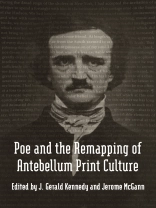Edgar Allan Poe (1809–1849) has long occupied the position of literary outsider. Dismissed as unrepresentative of the main currents of antebellum culture, Poe commented incisively — in fiction and nonfiction — on nationalism, science, materialism, popular taste, and cultural ideology. Opposing the pressure to write nationalistic ‘American’ tales or from a restricted New England perspective, he produced a body of work held in greater international esteem than that of any of his U.S. contemporaries.
In Poe and the Remapping of Antebellum Print Culture, scholars explore Poe’s anti-nationalistic Americanism as they redefine the outlines of antebellum print culture and challenge ideas that situate Poe at the margins of national thought and cultural activity.
The contributors offer fresh perspectives on an often-maligned author, including essays on Poe’s preoccupation with celebrity, his fascination with metropolitan crime and mystery, his impact as an observer of racial fear, his role as an eccentric cultural icon, and his fluctuating reputation in our own era. They also argue for new digital approaches that facilitate remapping of print culture.
Contributors: Anna Brickhouse, Betsy Erkkila, Jennifer Rae Greeson, Leon Jackson, J. Gerald Kennedy, Maurice S. Lee, Jerome Mc Gann, Scott Peeples, Leland S. Person, and Eliza Richards
Tentang Penulis
Jerome Mc Gann is the John Stewart Bryan University Professor at the University of Virginia and Visiting Research Scholar at the University of London and the University of California, Berkeley. He has authored and edited numerous books, including Radiant Textuality: Literature after the World Wide Web and The Scholar’s Art: Literary Studies in a Managed World.J. Gerald Kennedy is Boyd Professor of English at Louisiana State University. His other books include A Historical Guide to Edgar Allan Poe, The Portable Edgar Allan Poe, and Imagining Paris: Exile, Writing, and American Identity.












